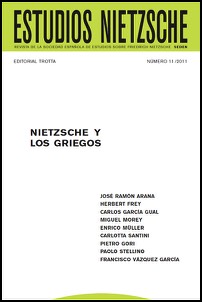Nietzsche, Mach and the Metaphysics of Self
DOI:
https://doi.org/10.24310/EstudiosNIETen.vi11.10509Keywords:
thought, metaphysics, psychologyAbstract
In an important aphorism of Beyond Good and Evil Nietzsche writes that anyone who believes in «immediate certainties» such as «I think» encounters a series of «metaphysical questions». The most important of these «problems of intellectual knowledge» is the existence of an ‘I’, as much as our believing it to be the cause of thinking. This article will deal with this observation – that in many ways is in compliance with the ideas of the
Austrian scientist Ernst Mach – and will show how Nietzsche describes the «ego» and, therefore, which are the grounds of his view on the mind-body problem.
Downloads
Metrics
References
Gori, P., Il meccanicismo metafisico. Scienza, filosofia e storia in Nietzsche e Mach, Bologna: Il Mulino, 2009.
Hussain , N., «Reading Nietzsche through Ernst Mach», en Nietzsche and Science, ed. de T. Brobjer and G. Moore, Aldershot: Ashgate, 2004, pp. 111-129.
Lange, F.A., Die Geschichte des Materialismus, Frankfurt am Main 1974 [1882].
Loukidelis, N, «Quellen von Nietzsches Verständnis und Kritik des cartesischen cogito, ergo sum», en Nietzsche-Studien 34 (2005), 300-309.
Lupo, L., Le colombe dello scettico, Pisa: ETS, 2006.
Mach, E., Die Analyse der Empfindungen und das Verhältnis des Physischen zum Psychischen, Ernst Mach Studienausgabe, Bd. 1, Berlin: Xenomoi Verlag, 2008.
Martinelli, R., Filosofia e psicofisica da Kant a Carnap, Macerata: Quodlibet, 1999.
Nietzsche, F., Obras Completas, I-IV (OC ). Director ed. Diego Sánchez Meca. Madrid: Tecnos, 2011-2016
Nietzsche, F., Correspondencia I-VI. (CO). Director ed. Luis E. de Santiago Guervós. Madrid : Trotta, 2005- 2012.
Nietzsche, F., Fragmentos Póstumos I-IV (FP). Director ed. Diego Sánchez Meca. Madrid: Tecnos, 2006-2010.
Orsucci, A., Dalla biologia cellulare alle scienze dello spirito, Bologna: Il Mulino, 1992.
Downloads
Published
How to Cite
Issue
Section
License
As of issue 21 (2021) this journal is published only in open access (diamond route).
From that number 21, like the previous numbers published in NIETZSCHE STUDIES, they are subject to the Creative Commons Acknowledgment-NoComercia-ShareIgual 4.0 license, the full text of which can be consulted at <http://creativecommons.org/licenses/by-nc-sa/4.0 >
It is the responsibility of the authors to obtain the necessary permissions of the images that are subject to copyright.
This work is licensed under a Creative Commons Attribution-NonCommercial-ShareAlike 4.0 International License.
Copyright generates two different rights: moral rights and patrimonial rights that EJFB recognizes and respects. Moral rights are those relating to the recognition of the authorship. They are rights of a personal nature that are perpetual, inalienable, unseizable and imprescriptible as consequence of the indivisible union of the author and his/her work.
Patrimonial rights are those that can be derived from the reproduction, distribution, adaptation or communication of the work, among others.







11.png)
